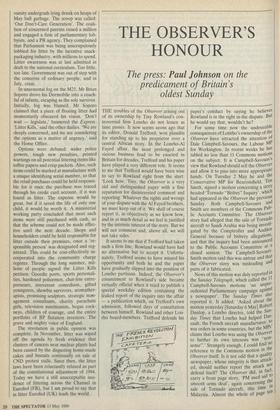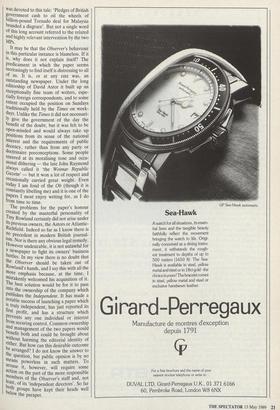THE OBSERVER'S HONOUR
predicament of Britain's oldest Sunday
THE troubles of the Observer arising out of its ownership by Tiny Rowland's con- troversial firm Lonrho do not lessen as time passes. It now seems aeons ago that its editor, Donald Trelford, won plaudits for standing up to his proprietor over a central African story. In the Lonrho-Al Fayed affair, the most prolonged and vicious business feud to be enacted in Britain for decades, Trelford and his paper have played a very different role. It seems to me that Trelford would have been wise to say to Rowland right from the start: `Look here, Tiny, the Observer is a very old and distinguished paper with a fine reputation for disinterested comment and reporting. Whatever the rights and wrongs of your dispute with the Al Fayed brothers, we must keep out of it. We shall of course report it, as objectively as we know how, and in as much detail as we feel is justified by the intrinsic interest of the story. But we will not comment and, above all, we will not take sides.'
It seems to me that if Trelford had taken such a firm line, Rowland would have had no alternative but to accept it. Unfortu- nately, Trelford seems to have missed his opportunity and both he and the paper have gradually slipped into the position of Lonrho partisans. Indeed, the Observer's commitment to Rowland's side became virtually official when it tried to publish a special weekday edition containing the leaked report of the inquiry into the affair — a publication which, on Trelford's own admission, followed days of consultation between himself, Rowland and other Lon- rho board-members. Trelford defends his paper's conduct by saying he believes Rowland is in the right in.the dispute. But he would say that, wouldn't he? For some time now the undesirable consequences of Lonrho's ownership of the Observer have attracted the attention of Dale Campbell-Savours, the Labour MP for Workington. In recent weeks he has tabled no less than 11 Commons motions on the subject. It is Campbell-Savours's view that Rowland should sell the Observer and allow it to pass into more appropriate hands. On Tuesday 2 May he and the Conservative MP for Beaconsfield, Tim Smith, signed a motion concerning a. story headed 'Tornado "Bribes" Inquiry', which had appeared in the Observer the previous Sunday. Both Campbell-Savours and Smith are members of the Commons Pub- lic AccOunts Committee. The Observer story had alleged that the sale of Tornado aircraft to Saudi Arabia was being investi- gated by the Comptroller and Auditor General because of bribery allegations, and that the inquiry had been announced to the Public Accounts Committee at a closed session. The Campbell-Savours- Smith motion said this was untrue and that the Observer story was misleading and parts of it fabricated. News of this motion was duly reported in the Sunday Telegraph, which called the 11 Campbell-Savours motions 'an unpre- cedented Parliamentary campaign against a newspaper'. The Sunday Times also reported it. It added: 'Asked about the motion yesterday [Saturday 6 May] Robert Dunlop, a Lonrho director, told the Sun- day Times that Lonrho had helped Das- sault, the French aircraft manufacturer, to win orders in some countries, but the MPs' claims that Lonrho was using the Observer to further its own interests was "non- sense"! Strangely enough, I could find no reference to the Commons motion in the Observer itself. Is it not odd that a quality newspaper, whose integrity is thus attack- ed, should neither report the attack nor defend itself? The Observer did, in fact, carry a front page story, 'PM used aid to smooth arms deal', again concerning the sale of Tornado aircraft, this time in Malaysia. Almost the whole of page ten
was devoted to this tale: 'Pledges of British government cash to oil the wheels of billion-pound Tornado deal for Malaysia branded a disgrace'. But not a single word of this long account referred to the related and highly relevant intervention by the two MPs.
It may be that the Observer's behaviour in this particular instance is blameless. If it Is, why does it not explain itself? The predicament in which the paper seems increasingly to find itself is distressing to all of us. It is, or at any rate was, an outstanding newspaper. Under the long editorship of David Astor it built up an exceptionally fine team of writers, espe- cially foreign correspondents, and to some extent occupied the position on Sundays traditionally held by the Times on week- days. Unlike the Times it did not necessari- ly give the government of the day the benefit of the doubt, but it was felt to be open-minded and would always take up positions from its sense of the national interest and the requirements of public decency, rather than from any party or doctrinaire preconceptions. Some people sneered at its moralising tone and occa- sional dithering — the late John Raymond always called it 'the Weimar Republic Gazette' — but it won a lot of respect and occasionally carried great weight. Even today I am fond of the Ob (though it is Constantly libelling me) and it is one of the Papers I most enjoy writing for, as I do from time to time.
The problems for the paper's honour created by the masterful personality of Tiny Rowland certainly did not arise under its previous owners, the Astors or Atlantic- Richfield. Indeed so far as I know there is no precedent in modern British journal- ism. Nor is there any obvious legal remedy. However undesirable, it is not unlawful for a newspaper to fight its owners' business battles. In my view there is no doubt that the Observer should be taken out of Rowland's hands, and I say this with all the more emphasis because, at the time,. I mistakenly welcomed his acquisition of it. The best solution would be for it to pass into the ownership of the company which Publishes the Independent. It has made a notable success of launching a paper which is truly independent, has just reported its first profit, and has a structure which prevents any one individual or interest from securing control. Common ownership and management of the two papers would benefit both and could be brought about without harming the editorial identity of either. But how can this desirable outcome be arranged? I do not know the answer to the question, but public opinion is by no means powerless in such matters. To arouse it, however, will require some action on the part of the more responsible m. embers of the Observer's staff and, not least, of its 'independent directors'. So far both groups have kept their heads well below the parapet.



























































 Previous page
Previous page